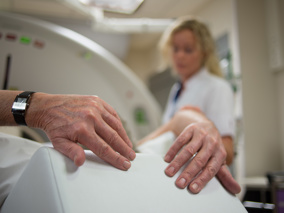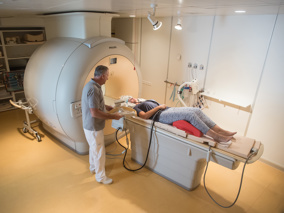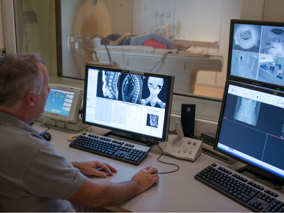Prostate cancer
Prostate cancer is cancer that originates in the prostate. The prostate is a gland that is located under the bladder in men and around the urethra. It is about the size of a walnut. The prostate produces a fluid that is part of the sperm. It helps the sperm cells to survive and move. Another word for prostate cancer is prostate carcinoma.
In the Netherlands, about 14,000 people get prostate cancer every year. Most people with prostate cancer are over 65 years old.
Do you have prostate cancer or is there a high suspicion of prostate cancer? You can ask your doctor for a referral to the Netherlands Cancer Institute.
Learn more about prostate cancer
Cause of prostate cancer
Prostate cancer often has no clear cause. However, there are several factors that increase the risk of prostate cancer. What we know so far is that men of African origin are more likely to develop prostate cancer. Men whose first-degree relative has died of prostate cancer also have a higher risk of prostate cancer.
Symptoms of prostate cancer
Prostate cancer usually grows slowly. Often there are no symptoms in the beginning. In some men, prostate cancer is discovered by accident, for example when they come to the doctor with urinary complaints. Sometimes prostate cancer is only found when there are metastases that cause symptoms in other places in the body. Often this is in the bones and lymph nodes.
Symptoms of prostate cancer may include:
- Frequent or frequent urination
- Difficulty urinating
- Pain and burning sensation when urinating
- Dripping and/or a weak or interrupted jet
- Feeling that the bladder is not empty after urination
- Cloudy or bloody urine
- Blood in the semen
Examination and diagnosis of elevated PSA
PSA (Prostate Specific Antigen) is a protein in the blood of men. It is made in the glandular tissue of the prostate. Every man has a little PSA in his blood. A 'diseased' prostate releases more PSA into the blood. If your PSA level is slightly higher than normal, the doctor will usually check it out. After some time, your blood will be tested again. A high PSA level does not necessarily mean that you have cancer. It can be caused by aging, inflammation of the prostate or a benign condition.
Is your PSA level very high? Then have this properly investigated. You will quickly get clarity from us through our rapid diagnostics.
A normal PSA level
The PSA level increases as you get older. These are the values we adhere to now:
- 40 to 55 years: less than 2.0
- 55 to 65 years: less than 3.0
- 65 to 75 years: lower than 3.0 – 4.0
Types of prostate cancer
Prostate cancer originates in the glandular tubules of the prostate. The risk of prostate cancer increases as you get older. Most men with prostate cancer are over 65 years old. Prostate cancer can also develop at a younger age, from about 45 years of age.
There are four types of prostate cancer:
- Non-metastatic prostate cancer
- Recurrent (recurring) prostate cancer after previous treatment
- Limited metastatic prostate cancer
- Metastatic prostate cancer
Prostate cancer treatment
The treatment you receive depends on the type of prostate cancer you have. We also look at the stage of the tumor and whether you have any symptoms. Your general health and fitness also play a role. You will hear exactly what is going to happen in advance and there is plenty of time to ask your questions.
The treatment is different for each situation:
- Prostate cancer without metastases: treatment usually consists of surgery or radiation. Sometimes you will also receive hormone therapy. It also happens that we actively monitor the cancer and do not treat you yet.
- Recurrence (relapsed) or limited metastatic prostate cancer: treatment usually consists of a combination of radiation (radiotherapy) and hormone therapy.
- Metastatic prostate cancer: Treatment may include a combination of hormone therapy, chemotherapy and sometimes radiotherapy.
Waiting
We want to inform you as well as possible about the waiting time per condition. We do this based on a prognosis of the current waiting list. The waiting time can vary from patient to patient for various reasons. Your attending physician will give you more information during your outpatient consultation.
-
15 days
First appointment
This is approximately how long it will take until you have your first appointment
-
13 days
Rapid diagnostics
This is approximately how long it will take before you can start rapid diagnostics at the NKI
-
16 days
Second opinion
This is approximately how long it will take before you come in for a second opinion at the NKI
 nl
nl







